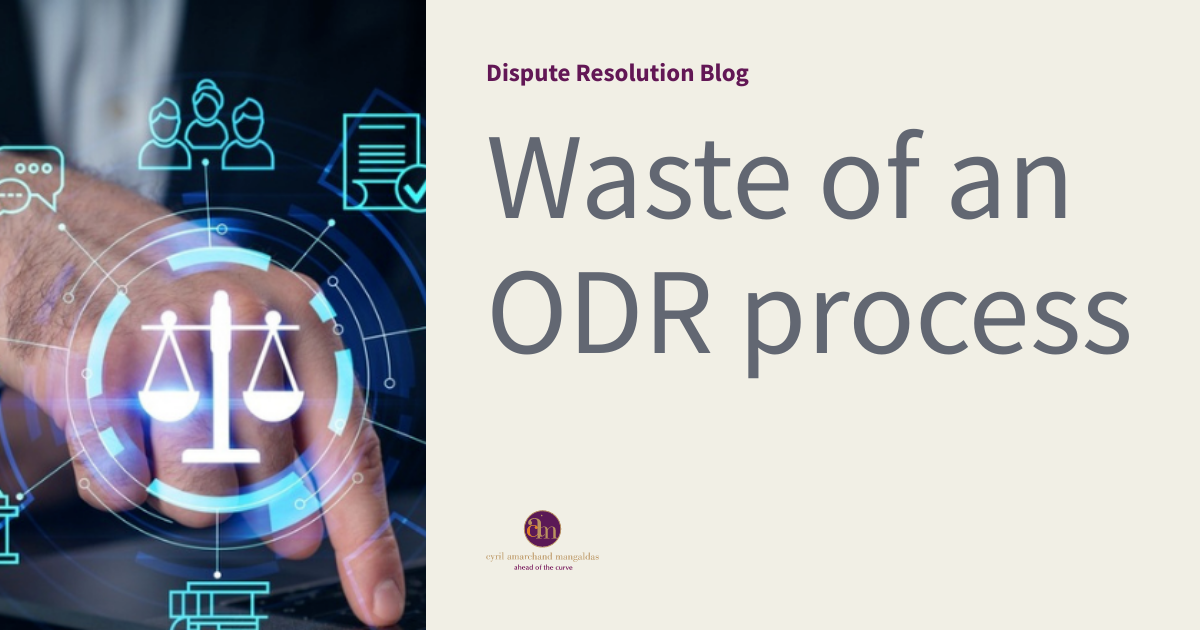Waste of an ODR process

Summary: The methods for appointment of arbitrators, as laid down by the Supreme Court, namely, mutual consent of the parties or pursuant to Section 11 of the Arbitration and Conciliation Act, 1996, were reiterated by the Bombay High Court in a Section 34 challenge. The petition relates to a financial institution unilaterally appointing arbitrator(s) through an ODR platform. The Bombay High Court sought statements from two ODR platforms, namely, Presolv360 and ADReS Now, on steps taken to ascertain whether the request for the appointment is lawful. It is imperative to have a carefully drafted arbitration clause to ensure that the outcome of arbitral proceedings involving an ODR platform aren’t nullified.
Introduction:
The Bombay High Court recently addressed the practice of financial institutions in India attempting to unilaterally appoint arbitrator(s) and initiate arbitral proceedings. The Online Dispute Resolution (“ODR”) Platforms such as Presolv360 and ADReS Now, which rely on algorithms to select arbitrator(s), were requested to submit a statement detailing whether the algorithm is coded to ensure adherence to the only two methods of appointing an arbitrator(s), as explicitly declared by the Hon’ble Supreme Court and not pursuant to clauses permitting unilateral appointment. The two methods for appointment of an arbitrator(s) are by mutual consent of the parties, or pursuant to Section 11 of the Arbitration and Conciliation Act, 1996 (hereinafter referred to as “the Act”).
Consequently, the award in question was quashed and set aside by mutual consent of the parties. The Hon’ble Bombay High Court subsequently issued notice to the ODR Platforms, requesting them to submit responses detailing the procedures involved in handling requests for appointment of an arbitrator, in relation to the law governing unilateral appointment of arbitrators.
Brief background:
An arbitration agreement was entered into between Radiance Galore (hereinafter referred to as “Petitioner”) and Yes Bank Ltd. (hereinafter referred to as “Respondent”) that envisaged the unilateral appointment of an arbitrator. This position was admittedly implemented by the Respondent and was carried out through an ODR Platform, after the law on unilateral appointment of arbitrators was explicitly declared by the Supreme Court.
The arbitration proceedings concluded with an arbitral award in favour of the Respondent, which prompted the Petitioner to challenge the arbitral award before the Hon’ble Bombay High Court under Section 34 of the Act.
The counsel for the Respondent, on instructions, withdrew the arbitration proceedings despite the award being in its favour, on the ground that the arbitrator appointment was made unilaterally. The Hon’ble Bombay High Court noted that financial institutions have been resorting to withdrawing arbitration proceedings upon facing challenges to awards passed by unilaterally appointed arbitrators under Section 34 of the Act.
The Hon’ble Bombay High Court issued notice to two ODR platforms, namely Presolv360 and ADReS Now. The Court sought statements from the platforms detailing how they deal with requests for appointment of an arbitrator to deal with the law governing unilateral appointment of arbitrations. The Hon’ble Bombay High Court noted that these two platforms were asked to appoint arbitrators in many matters. The statement sought by the ODR platforms would indicate the method of appointment and selection of arbitrators. It was pertinent to ensure that an arbitral tribunal is not constituted unilaterally and is constituted only when the request for appointment has been made by consent of the parties or pursuant to a direction by the Court under Section 11 of the Act.
Analysis:
The issue arises due to arbitration agreements permitting unilateral appointment of arbitrators. This issue was further perpetuated by the ODR platform that acted on the financial institutions’ action of seeking the unilateral appointment of arbitrator(s). It was eventually the unilateral nature of the appointment that to the arbitral award being quashed.
It has been observed there have been numerous instances of unilateral appointment of arbitrator(s). Accordingly, it is essential that the process for appointing arbitrator(s) strictly adheres to the conditions prescribed by the Hon’ble Supreme Court, namely, appointment by mutual consent of the parties or pursuant to a court direction under Section 11 of the Act.
Further, the details sought by the Hon’ble Bombay High Court regarding the method of appointment of arbitrator(s) and selection of arbitrator(s) by the two ODR platforms are indicative of the Court’s intention to expand its understanding of the process adopted by ODR platforms. The details furnished by the ODR platforms may be telling of the level of care undertaken to ensure the method of appointment and selection of arbitrator(s) is as envisaged. The clarity would not only provide comfort to both the contracting parties but also High Courts across the country to refer matters to ODR platforms for appointment of arbitrator(s).
Ultimately, the rationale behind parties opting to avail the services of an ODR platform stems from, each otherit being quicker, cost efficient as well as confidential. However, these benefits are stripped away when the arbitration clause isn’t carefully drafted or when parties act in contravention of the provisions of the Act. It is important to not lose sight of the fact that arbitration is an adjudicatory process and there are numerous guardrails in the Act that ensure that the eventual award is the one that meets the requirements of law.
For obtaining optimal results, a simple, time-tested solution could be to consider use of measures such as use of an established arbitral institution and incorporating the model clause of the institution in the arbitration agreement between parties.

